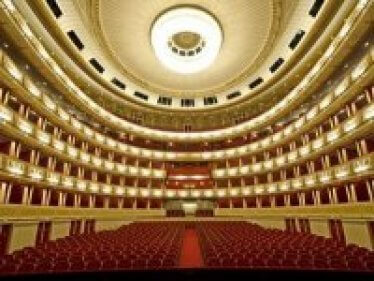Parsifal - Schedule, Program & Tickets
Parsifal
Musical Direction Philippe Jordan
Inszenierung, Bühne & Kostüme Kirill Serebrennikov
Lighting Design Franck Evin
Ko-Regie Evgeny Kulagin
Mitarbeit Bühne Olga Pavluk
Mitarbeit Kostüm Tatiana Dolmatovskaya
Video Ilya Shagalov
Dramaturge Sergio Morabito
Amfortas Ludovic Tézier
Gurnemanz Georg Zeppenfeld
Titurel Peter Kellner
Parsifal Jonas Kaufmann
Klingsor Wolfgang Koch
Kundry Elīna Garanča
The plot of the play takes place during the Christian reconquest on the Arab-occupied Spanish peninsula. The opening scene shows the band of men, or Knights of the Holy Grail, which has become susceptible to crisis. It has been witnessed, time and time again, that knights have deserted their posts only to join the kingdom of the sorcerer Klingsor, who has emasculated himself in his striving for sexual abstinence and was rejected previously by the circle of knights. Through his castration, Klingsor now has the power to dominate women. He uses the power of these maidens to leer and bring the all-faithful band of Christian knights to their death. He was even capable of enticing the King of the Grail, Amfortas, to make a mistake by stealing his holy spear and inflicting an incurable wound – the aftermath of which has Amfortas wailing of the ordeal that the ritual unveiling of the Grail has become, which he only carries out dutifully upon being pressured by his father, who is "living in the grave", and which he then wholly refuses to perform upon the latter's death. However, only a destined “pure fool” could undo the sins of the Grail King and reverse its devastating consequences. A decisive role in this work of redemption is played by an enigmatic woman who travels under different identities both in the territory of the Holy Grail’s Castle and in Klingsor's enchanted castle.
Wagner's last magnificent opera brings together the problems with which the poet-composer's entire oeuvre confronts the audience: Avant-garde and romanticism, combined with the dissolution of boundaries and ideology, intertwine almost indissolubly. The genre name of "Bühnenweihfestspiel” (Wagner’s own description of his last work, which means sacred festival drama) refers to the claim of an art religion. For 30 yeas until the copyright expired, the performance was reserved for the Bayreuth Festival, where theatre is staged as a ritual. In the haze of the festival theatreracist world views flourished, hinting at the purity ideology of Parsifal, suggesting that it was an anti-Semitic play to inspire a “people”.
Subject to change.
Inszenierung, Bühne & Kostüme Kirill Serebrennikov
Lighting Design Franck Evin
Ko-Regie Evgeny Kulagin
Mitarbeit Bühne Olga Pavluk
Mitarbeit Kostüm Tatiana Dolmatovskaya
Video Ilya Shagalov
Dramaturge Sergio Morabito
Amfortas Ludovic Tézier
Gurnemanz Georg Zeppenfeld
Titurel Peter Kellner
Parsifal Jonas Kaufmann
Klingsor Wolfgang Koch
Kundry Elīna Garanča
The plot of the play takes place during the Christian reconquest on the Arab-occupied Spanish peninsula. The opening scene shows the band of men, or Knights of the Holy Grail, which has become susceptible to crisis. It has been witnessed, time and time again, that knights have deserted their posts only to join the kingdom of the sorcerer Klingsor, who has emasculated himself in his striving for sexual abstinence and was rejected previously by the circle of knights. Through his castration, Klingsor now has the power to dominate women. He uses the power of these maidens to leer and bring the all-faithful band of Christian knights to their death. He was even capable of enticing the King of the Grail, Amfortas, to make a mistake by stealing his holy spear and inflicting an incurable wound – the aftermath of which has Amfortas wailing of the ordeal that the ritual unveiling of the Grail has become, which he only carries out dutifully upon being pressured by his father, who is "living in the grave", and which he then wholly refuses to perform upon the latter's death. However, only a destined “pure fool” could undo the sins of the Grail King and reverse its devastating consequences. A decisive role in this work of redemption is played by an enigmatic woman who travels under different identities both in the territory of the Holy Grail’s Castle and in Klingsor's enchanted castle.
Wagner's last magnificent opera brings together the problems with which the poet-composer's entire oeuvre confronts the audience: Avant-garde and romanticism, combined with the dissolution of boundaries and ideology, intertwine almost indissolubly. The genre name of "Bühnenweihfestspiel” (Wagner’s own description of his last work, which means sacred festival drama) refers to the claim of an art religion. For 30 yeas until the copyright expired, the performance was reserved for the Bayreuth Festival, where theatre is staged as a ritual. In the haze of the festival theatreracist world views flourished, hinting at the purity ideology of Parsifal, suggesting that it was an anti-Semitic play to inspire a “people”.
Subject to change.
There are no products matching the selection.






